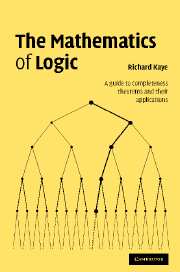Book contents
- Frontmatter
- Contents
- Preface
- How to read this book
- 1 König's Lemma
- 2 Posets and maximal elements
- 3 Formal systems
- 4 Deductions in posets
- 5 Boolean algebras
- 6 Propositional logic
- 7 Valuations
- 8 Filters and ideals
- 9 First-order logic
- 10 Completeness and compactness
- 11 Model theory
- 12 Nonstandard analysis
- References
- Index
6 - Propositional logic
Published online by Cambridge University Press: 28 January 2010
- Frontmatter
- Contents
- Preface
- How to read this book
- 1 König's Lemma
- 2 Posets and maximal elements
- 3 Formal systems
- 4 Deductions in posets
- 5 Boolean algebras
- 6 Propositional logic
- 7 Valuations
- 8 Filters and ideals
- 9 First-order logic
- 10 Completeness and compactness
- 11 Model theory
- 12 Nonstandard analysis
- References
- Index
Summary
A system for proof about propositions
We are going to develop a formal system for proofs about boolean algebras, just as in a previous chapter we developed one for posets. It will also be rich enough to simulate proofs in the systems given in Chapters 3 and 4, though we will not be in a position to explain the precise connections until Chapter 7. (For this, please see Examples 7.27 and 7.29.)
The system will contain objects representing elements of a boolean algebra that say things such as a ≤ b and a = b, but there is a subtle and rather elegant point here: with our extra symbols for Λ, ν, ′, Τ, ⊥ we do not need to use either of the symbols < or ≤, since a ≤ b holds if and only if a ′ Λb = Τ. Instead, the statements in our system will be elements of the boolean algebra – or rather terms representing elements in the boolean algebra – and if a statement is provable or derivable we shall think of it as being true, or equal to Τ.
The next definition explains the terms which will represent elements of some boolean algebra.
Definition 6.1 Let X be any set, which for this definition will be called a set of propositional letters.
Information
- Type
- Chapter
- Information
- The Mathematics of LogicA Guide to Completeness Theorems and their Applications, pp. 64 - 79Publisher: Cambridge University PressPrint publication year: 2007
